About Koch County
Koch County is situated in Unity State of South Sudan, it borders Mayom County to the northwest, Rubkona County to the north, Guit County to the northeast, Mayendit County to the south, Jonglei State (specifically Fangak and Ayod Counties) to the east, and Warrap State (specifically Tonj North County) to the west[1]. The terrain of the county is mostly flat and prone to flooding, characterized by a mixture of savannah grasslands, bushes, and forests. This geographical makeup makes it one of the most flood-prone areas in South Sudan. Flooding and displacement continued to impact the county negatively[2]. The poor quality of roads, particularly during the rainy season, has made it challenging to access certain parts of the county, exacerbating the livelihood crisis within the region. The county has also been heavily affected by conflict and insecurity, including cattle raiding between Koch residents and neighbouring communities[3]. According to OCHA’s Humanitarian Needs Overview for 2023, the number of people in need of humanitarian support in Koch County has been increasing and is approximated to be 80,099 individuals[4]. As of 2023, the estimated population of Koch County is 98,851 people, and this number is expected to increase due to the influx of returnees and refugees escaping the ongoing conflict in Sudan through Nyaruop port [5]. This port is located in Koch County and is the main transit station for many of the returnees from Sudan[6]. It is estimated that a total of 188 households (approximately 742 individuals) have settled in Koch after fleeing from Sudan conflict between the months of April and August. As at 22nd September 2023, additional 409 individuals were stranded at the port waiting for means of transport to their final destination.
The healthcare situation in Koch County
Acute watery diarrhoea, malaria, and acute respiratory infections are some of the leading causes of hospitalization. These diseases are also major contributors to child morbidity and mortality in the county. In a survey conducted by Coalition for Humanity, at least 84% of the surveyed households in Koch had recorded malaria among children, while 66% had reported cases of diarrhoea. The general disease burden in Koch is further implied by the prevalence of infectious diseases. Seventy-four percent of surveyed households reported at least one case of watery diarrhoea, followed by typhoid (67%), acute bloody diarrhoea (51%), acute respiratory infections (34%), and cholera (33%)[7]. Twenty-eight percent of surveyed households had lost a child to death, and (26%) of the deaths were attributed to acute bloody diarrhoea, 21% to malaria, and 18% to acute respiratory infection.
The high prevalence of diarrhoeal diseases can be ascribed to the poor access to water, sanitation, and hygiene (WASH) services in Koch County. Eighty percent of the population does not have access to toilets or latrines, and most households drink water from open reservoirs that is unsafe to drink. In addition, more than half of the households surveyed (57%) reported high levels of stunting growth among children under the age of 5 years, indicating widespread malnutrition. Half of the surveyed households (50%) had between 1 and 3 children who were malnourished, with 26% having between 4 and 10 malnourished children.
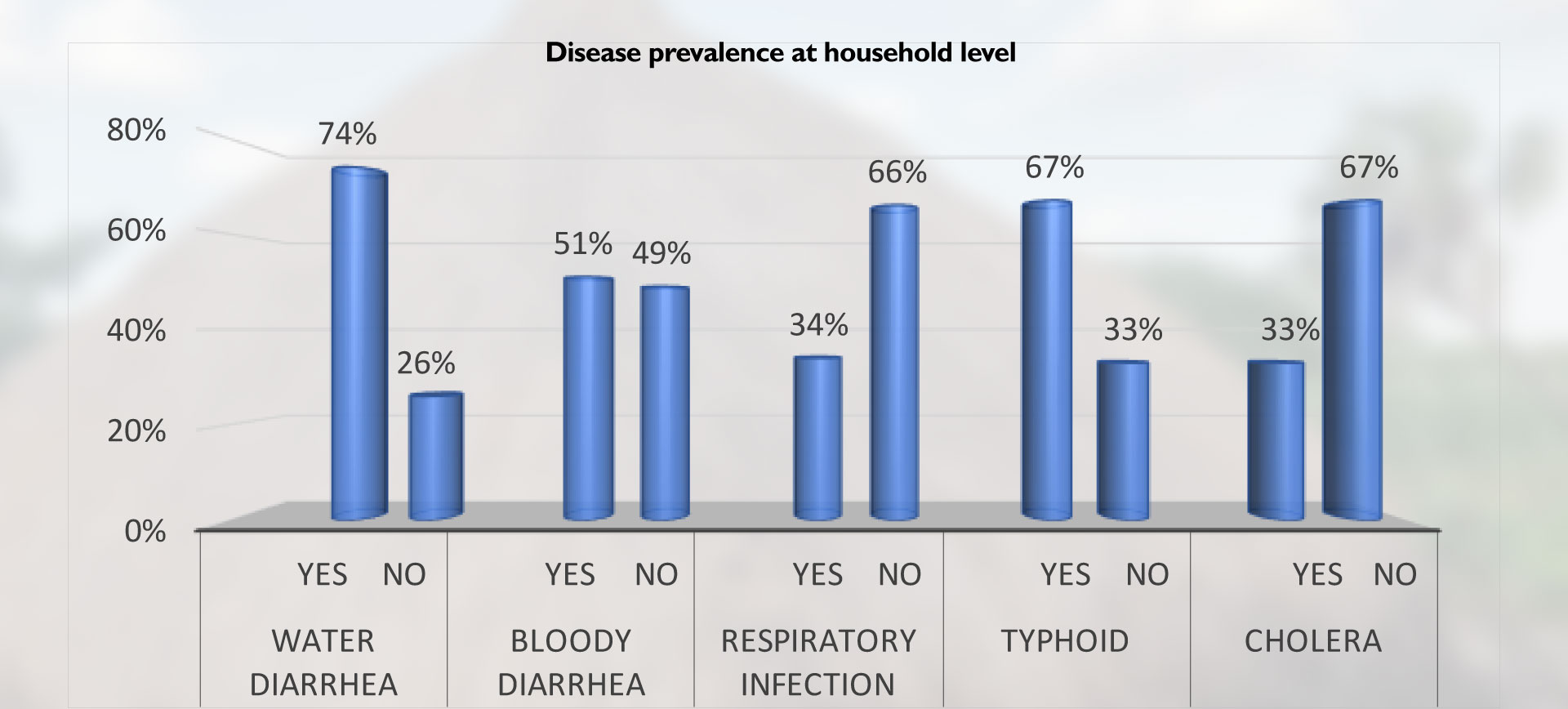
Health facilities in Koch County
Koch County boasts a total of 14 health facilities, with 10 currently operational. These consist of 1 hospital, 3 Primary Health Care Centers (PHCCs), and 5 Primary Health Care Units (PHCUs). Among these, three functional health facilities—Mirmir PHCC, Boaw PHCC, and Rier (Tharjath) PHCU—are operating under the UNICEF WORLD BANK project, which is being executed by the Coalition for Humanity (CH) in partnership with the International Medical Corps (IMC). The primary referral health facility in Koch County is the Koch County Hospital, overseen by the International Medical Corps (IMC). The remaining four facilities are managed by the International Rescue Committee (IRC), which includes Patit PHCC, Gany PHCU, Ngony PHCU, and Pakur PHCU. Other operational facilities consist of Lablani PHCU (Juak) and Petpet PHCU, where World Relief operates nutritional centres.
Due to the limited scope of health funding in the County, most health facilities only offer outpatient consultations and treatment. A large proportion of the population cannot access major and minor surgery, inpatient hospital admissions, obstetric services, pharmaceutical and laboratory services, as well as sexual and reproductive health services.
As a result of conflict, returnees fleeing sudan are transiting through Nyaruop port in Koch county, the delay in transport has led to some households setting at the port, and this created a need for health care services. CH is currently offering mobile clinic services at the Nyaruop Port IDP camp, which accommodates approximately 500 returnees from Sudan. It is estimated that some households may stay longer hence a future need for a static health facility at the camp. This is because the few available health facilities are difficult to access for most of the population, especially considering the poor roads, which are often cut off during the rainy season. Thirty six percent (36%) of the surveyed population lived very far from a health facility (21 to 40 km), 32% lived 6 to 10 km away, 23% lived 11 to 20 km away, and 2% said the nearest facility was more than 40 km away and therefore inaccessible.
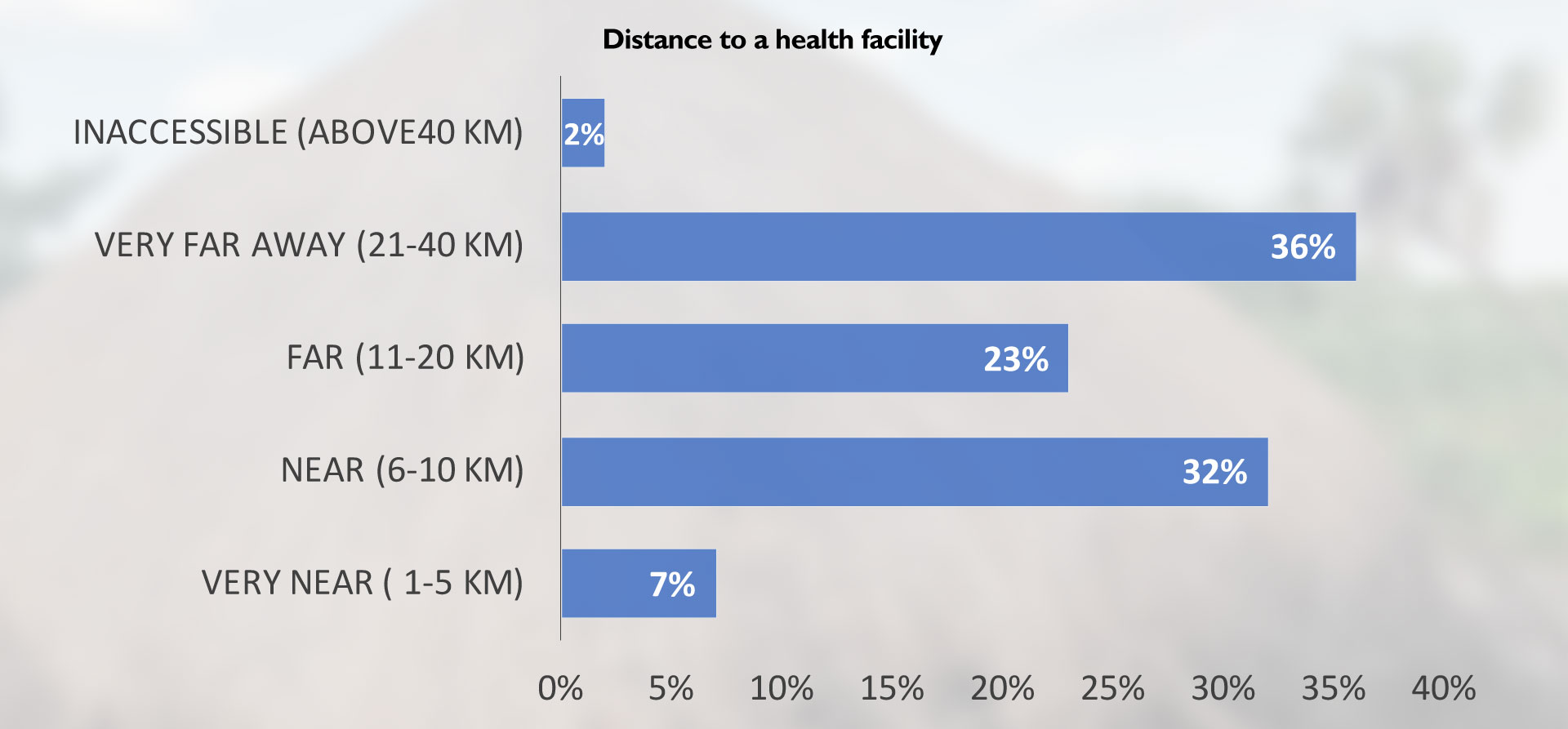
The poor accessibility of health facilities is one of the main reasons for the poor delivery of maternal health services. At least 32% of the surveyed households had mothers who did not attend antenatal care clinics and 23% had mothers who did not attend postnatal care clinics. Additionally, 31% of the surveyed households reported cases of maternal death in the 12 months preceding the survey.
A closer look into the state of the health facilities
1. Boaw Primary Health Care Centre (PHCC)
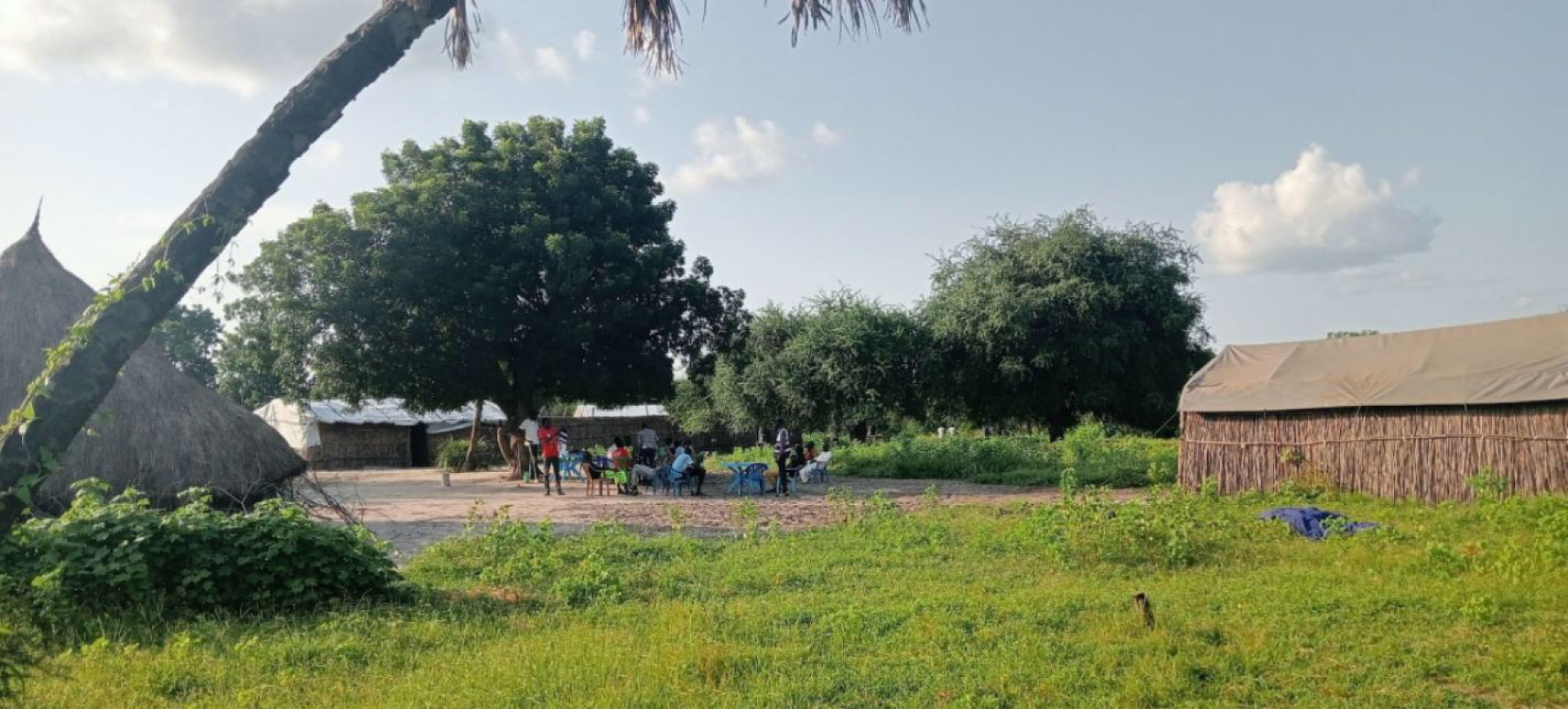
Wider view of Boaw PHCC Premise – Photo shot in 29Th June 2023
Our team conducted a joint routine monitoring and supervision of the health facilities in Koch County, visiting Mirmir PHCC, Boaw PHCC, and Rier (Tharjath) PHCU. On July 28, 2023, the team visited Boaw PHCC. This facility caters to a remote population that was displaced from the administrative unit of Boaw Payam. It also serves the populations of Maar, Thoriar, Duar, Thondol, and Lab-labni Bomas, bringing the estimated catchment population to 32,597 people. Accessing the facility is challenging, particularly during the rainy season when the roads become flooded. Our team rented two motorbikes, but encountered an impassable point, necessitating a 2-hour walk from Thoriar Boma to reach the facility. Considering the distance of some settlements from the facility, community members walk an average of six hours to reach it, primarily because they cannot afford motorbikes, the sole available means of transportation.
The original Boaw PHCC was submerged in a swamp due to floods two years ago. Consequently, a temporary structure was erected at Maar Boma. The current structure has suffered significant damage from weather and environmental factors, such as termite infestations, leading to persistent leaks. The facility lacks wards and admission beds, and it is common to find critically ill patients lying on the floor. Additionally, there is no latrine on the premises, forcing patients and staff to use the neighbouring nutrition centre’s facilities. Outpatient department (OPD) consultations occur under a tree, which is difficulty at night or in rainy conditions. The “tukul” utilized as a pharmacy is in a state of disrepair, with a leaking roof, dusty floor, and inadequate ventilation necessary for proper drug storage. There are no shelves for the organized categorization of drugs, resulting in some medicines expiring and others being damaged by moisture and roof leaks.
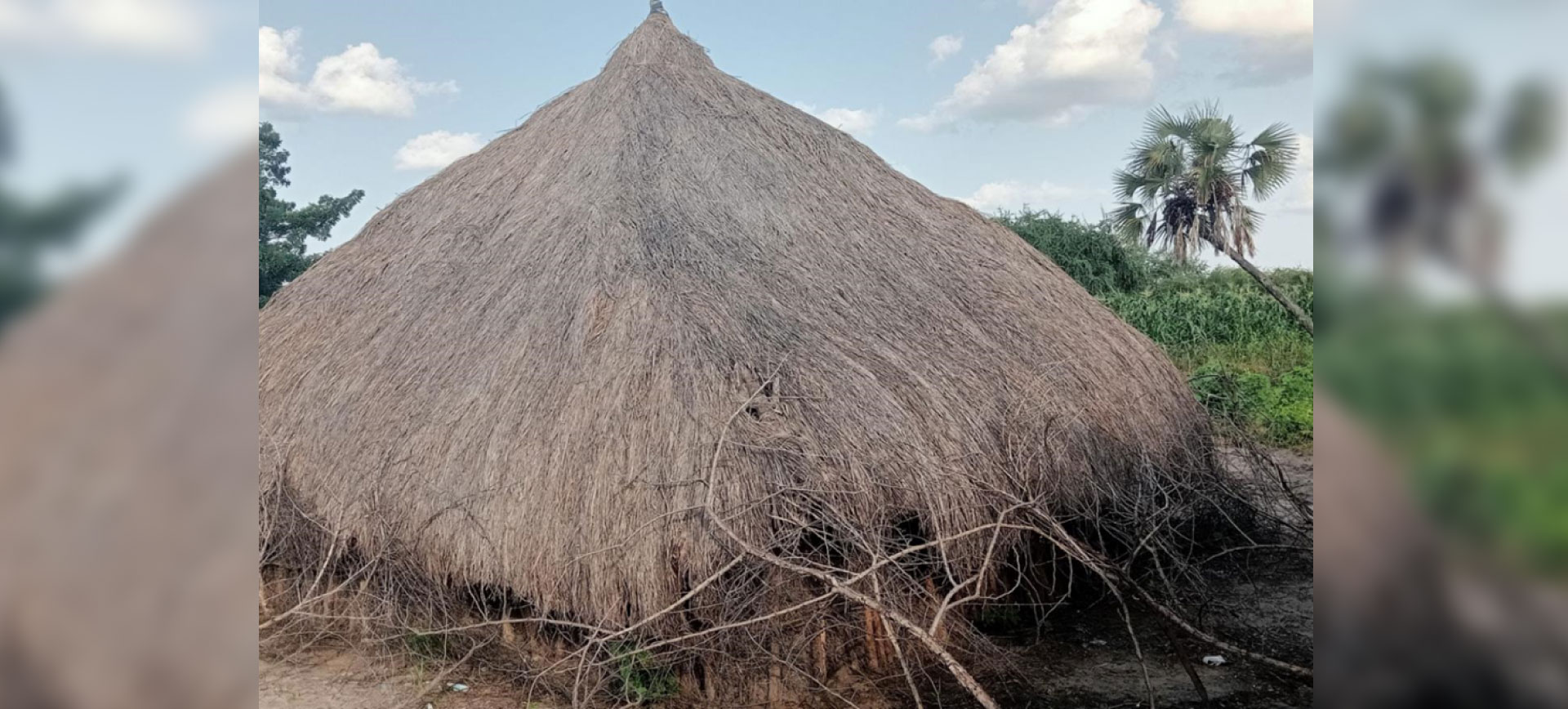
Boaw PHCC pharmacy/ drug store (Photo shot in July 28, 2023).
While child deliveries are provided at the facility, the absence of beds results in deliveries occurring on the floor. The facility is ill-equipped to handle delivery complications, and such cases are typically referred to Koch County Hospital, which is a six-hour journey on foot. In terms of healthcare equipment, the facility is sorely lacking, with only a limited set of equipment provided by the current project, including a blood pressure machine, thermometer, examination gloves, MUAC tape, EPI cold box equipment, VDRL, HCG, and urine dipstick tests.
2. Mirmir PHCC
On August 2, 2023, the team paid a visit to Mirmir Primary Health Care Centre (PHCC). This facility is situated in Mirmir Payam, to the southeast of Koch County’s administrative headquarters. Mirmir PHCC caters to the healthcare needs of the population in the south-eastern region of Koch County and certain areas in Mayendit County, thereby serving a total catchment population of 17,712 individuals. The closest alternative health facility to Mirmir PHCC is Kuok Primary Health Care Unit (PHCU), which is located in Mayendit County.
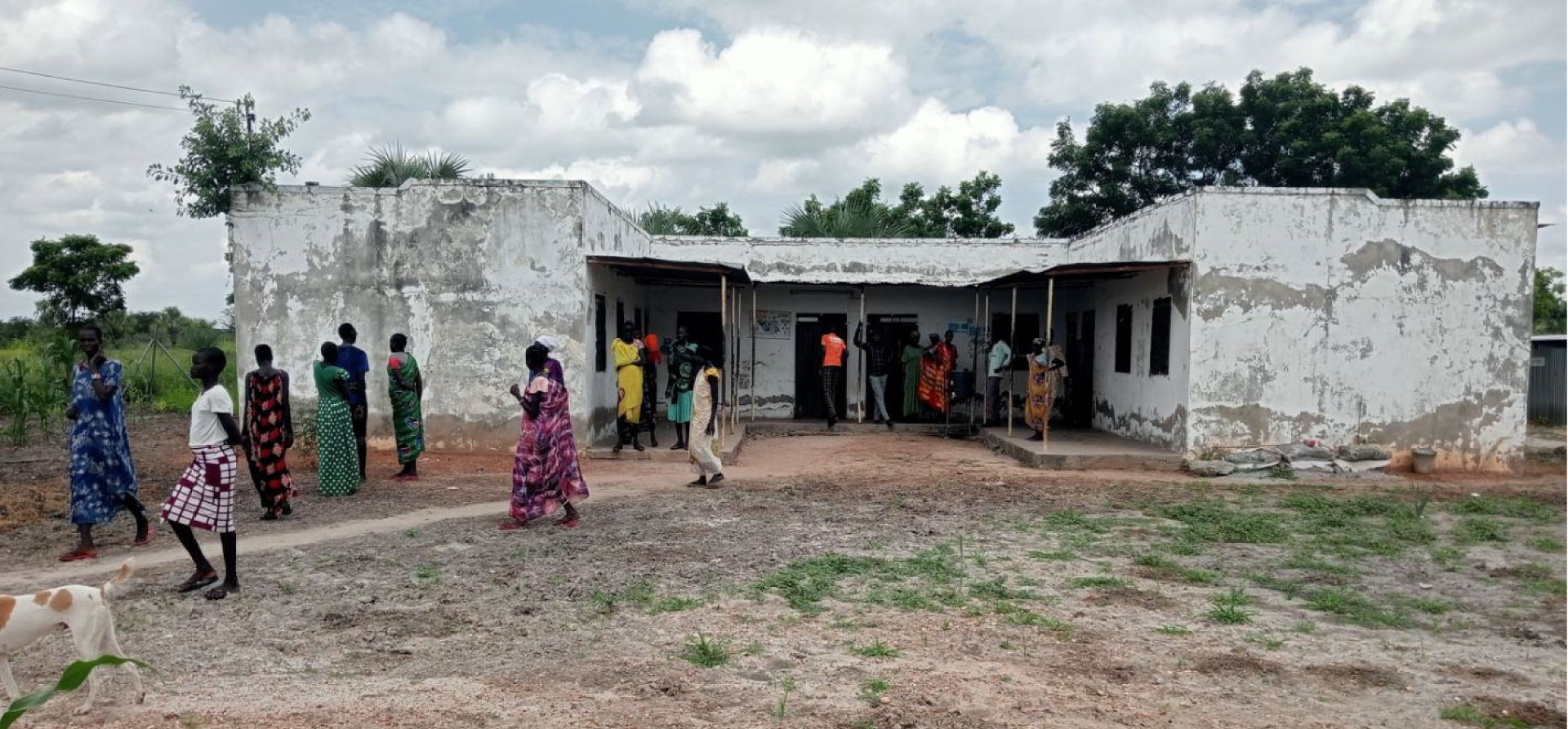
Mirmir PHCC in Mirmir Payam in Koch County (Photo shot in 2nd August 2023)
While the health facility has a permanent structure, it is in dire need of renovation. There are issues such as roof leaks in the maternity ward and drug store. Furthermore, the pharmacy’s windows are damaged, allowing moisture to infiltrate, potentially jeopardizing the integrity of medications. Additionally, there is an absence of available transportation, which poses challenges in transporting patients to the facility or arranging emergency referrals. The pit latrine is also in a state of disrepair, resulting in overflow, and there is no proper waste disposal system in place.
In terms of medical equipment, the facility is ill-equipped to meet the demand for common medical cases. The only equipment on hand is what has been provided through the current project, including a thermometer, examination gloves, EPI equipment, a delivery couch, delivery kits, and health educational materials. The laboratory is solely equipped to conduct Rapid Diagnostic Tests (RDT) for malaria and other conditions. Other laboratory services remain unavailable due to insufficient funding.
Currently, the facility offers normal delivery services, with complicated cases referred to Koch County Hospital. Other services provided include referrals, vaccinations for BCG, Polio, DPT, and Measles, basic Antenatal Care (ANC) protocols, HIV screening, tuberculosis screening, and family planning services. Nevertheless, these services are constrained by the scope of the existing funding and are not assured beyond the duration of the project.
3. Rier Primary health Care Unit (PHCU)
The team also visited Rier Primary Health Care Unit (PHCU) and they witnessed similar challenges faced by many other health facilities in Koch County, South Sudan. This facility, located in Jaak Payam, provides essential healthcare services to a catchment population of approximately 23,211 residents. While it exhibits some positive aspects, it is plagued by numerous shortcomings that have significantly continued to impede health service delivery to the local community.
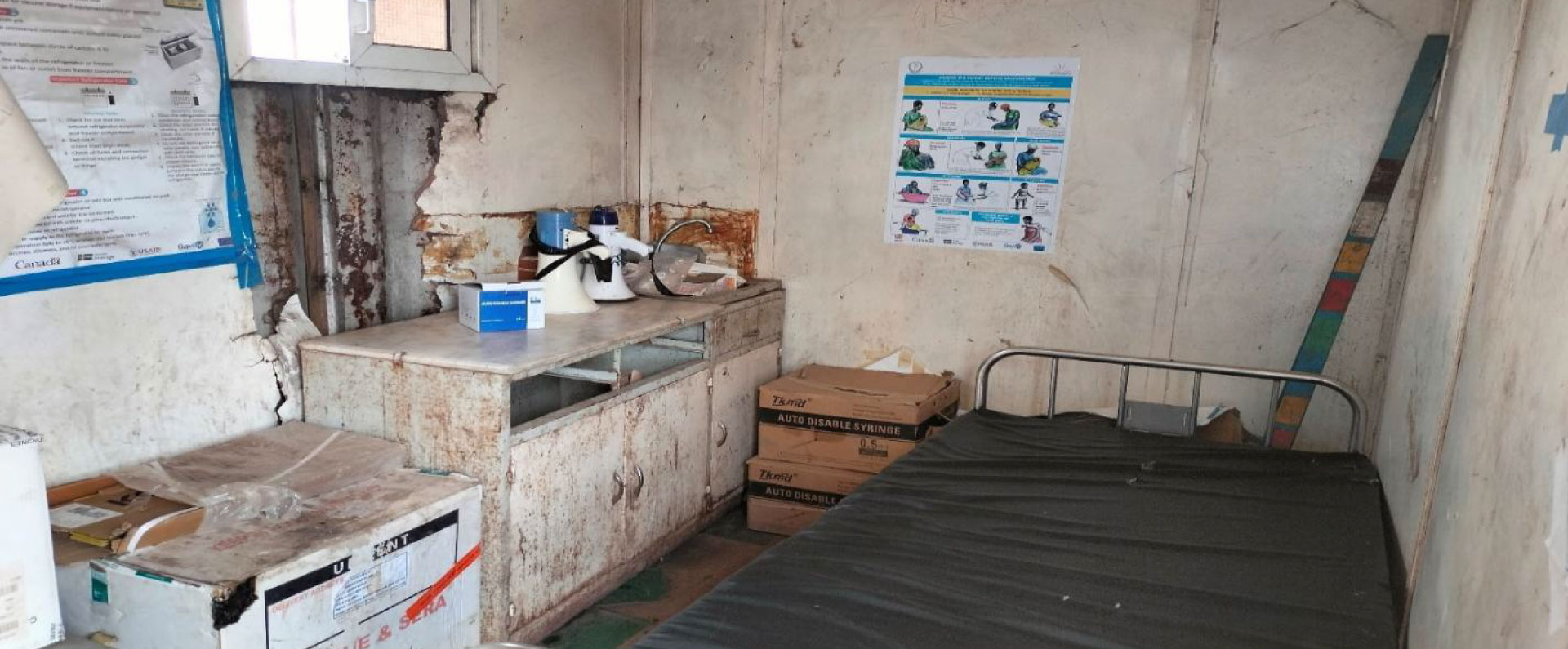
Rier PHCU Vaccination and short stay room (Photo-27th June 2023)
The facility boasts a permanent structure and a fenced compound, which can be seen as promising signs. However, the lack of a proper gate to control access raises security concerns. Furthermore, there is a pressing need for improvements to the roofing, floor, and walls of the facility’s structures. The pit latrine is full, other sanitation facilities damaged, and this presents sanitation issues that must be addressed urgently.
The pharmacy at Rier PHCU faces significant challenges, including poor ventilation, a cramped space, and leakage from the roof, creating an unfavourable environment. Wasp and bee infestations further compromise safety of the drugs. While the facility currently maintains a relatively adequate drug stock, it stores drugs on tables with poor organization, potentially jeopardizing the effectiveness and safety of the medications. Rier PHCU is equipped with a few essential items, including BEmONC equipment, examination tables, and education materials. The facility lacks critical equipment and this gap hinder accurate diagnosis and treatment. The facility provides basic services, including normal deliveries, vaccinations, ANC protocols, and family planning services.
The expectations of the people of Koch
In Koch County, South Sudan, access to healthcare services is a fundamental concern that profoundly impacts the lives of its residents. The people of Koch County have the right to access quality healthcare services, but the prevailing situation falls far short of the global, regional, and national expectations, as well as the principles enshrined in human rights declarations.
The UN’s Sustainable Development Goals (SDGs) provide a clear roadmap for improving healthcare access worldwide. SDG 3, “Ensure healthy lives and promote well-being for all at all ages,” underscores the importance of equitable access to healthcare services for all, irrespective of their socio-economic status but the current health facility structures do not provide a conducive environment for service delivery. The world health organization (WHO), sets standards for healthcare delivery and emphasizes the need for universal health coverage. This implies that every person should have access to essential healthcare services[1]. These global standards underscore the need for accessible, affordable, and high-quality healthcare services, which are currently elusive for the people of Koch County.
South Sudan, just like any other country in Africa, has a responsibility to ensure universal health care services as set by the African Union (AU). The Abuja Declaration of 2001, for instance, called for member states to allocate at least 15% of their annual budgets to healthcare, with the aim of improving access and quality of services[2]. Regrettably, this commitment has not been fully realized in Koch County, and the consequences are acutely felt by its residents.
Access to healthcare is not just a matter of convenience; it is a fundamental human right. The Universal Declaration of Human Rights, adopted by the UN General Assembly in 1948, explicitly recognizes the right to healthcare as an essential component of the right to an adequate standard of living[3]. This includes the right to the highest attainable standard of physical and mental health, as articulated in the International Covenant on Economic, Social and Cultural Rights (ICESCR)[4].
Ensuring access to quality healthcare requires several building blocks, including adequate healthcare infrastructure, a well-trained healthcare workforce, access to essential medicines and technologies, and effective health governance and financing systems[5]. In Koch County, these building blocks are often lacking or inadequate, further exacerbating the gap between expectations and reality.
The people of Koch County deserve access to healthcare services that meet global, regional, and national standards, as well as the principles of human rights. Bridging the gap between these expectations and the current healthcare reality in Koch County is not just a matter of policy; it is a moral imperative and a fundamental human right.
The hope of the people of Koch County
In order to ensure the delivery of high-quality and reliable healthcare services in Koch County, there is an urgent need to revitalize the healthcare facilities within the county. This involves the elevation of the overwhelmed Primary Health Care Centres (PHCC) into fully-fledged hospitals and the upgrading of Primary Health Care Units (PHCU) to PHCC status. This upgrade must also include ensuring the presence of well-trained medical personnel and a consistent supply of reliable medical equipment and drugs.
It is crucial to construct long term and decent structures within the healthcare facilities to ensure security and effective storage for medications and equipment. Some facilities, such as Mirmir PHCC, which already have permanent structures, require extensive repairs to improve conditions for patient treatment and the storage of equipment and medication. The facilities also need decent and sustainable latrines and incinerators to ensure sanitation and proper disposal of waste. This is vital in preventing the spread of waterborne and communicable diseases.
The residents of Koch County believe that the government, humanitarian organizations, and development partners can facilitate the improvement of the healthcare facilities to ensure quality and reliable healthcare in the County. The World Health Organization Constitution of 1946 emphasizes the importance of active involvement by all national stakeholders, including non-state entities such as non-governmental organizations, across all phases of healthcare programming[1]. This underscores the urgency for stakeholders to take immediate action to improve the healthcare situation in Koch County and alleviate the plight of the local community.
Coalition for Humanity (CH) stands in solidarity with the residents of Koch County and individuals from various parts of the country, all of whom recognize the pressing need for an improved health care services, the need for descent humanitarian support. The existing roads are often damaged by floods and occasionally become impassable, making it extremely difficult to access essential services such as healthcare. Consequently, CH strongly advocates for funding and initiatives aimed at constructing durable and flood-resilient roads to address the challenges associated with service access, as exemplified by the situation in Koch County.
Refrences
- [1] https://www.who.int/about/governance/constitution
- [1] https://www.who.int/news-room/fact-sheets/detail/universal-health-coverage-(uhc)
- [2] https://au.int/sites/default/files/pages/32894-file-2001-abuja-declaration.pdf
- [3] UN, Universal Declaration of Human Rights
- [4] UN International Covenant on Economic, Social and Cultural Rights
- [5] https://www.ncbi.nlm.nih.gov/pmc/articles/PMC5651704
- [1] https://www.csrf-southsudan.org/county_profile/koch
- [2] https://www.csrf-southsudan.org/county_profile/koch
- [3] https://www.csrf-southsudan.org/county_profile/koch
- [4] South Sudan Humanitarian Needs Overview for 2023 – UN OCH
- [5] https://www.csrf-southsudan.org/county_profile/koch
- [6] IOM-DTM Returnees Population Primary Movement Overview, April – August 2023
- [7] Healthcare Gap Assessment for Koch County, Survey Report

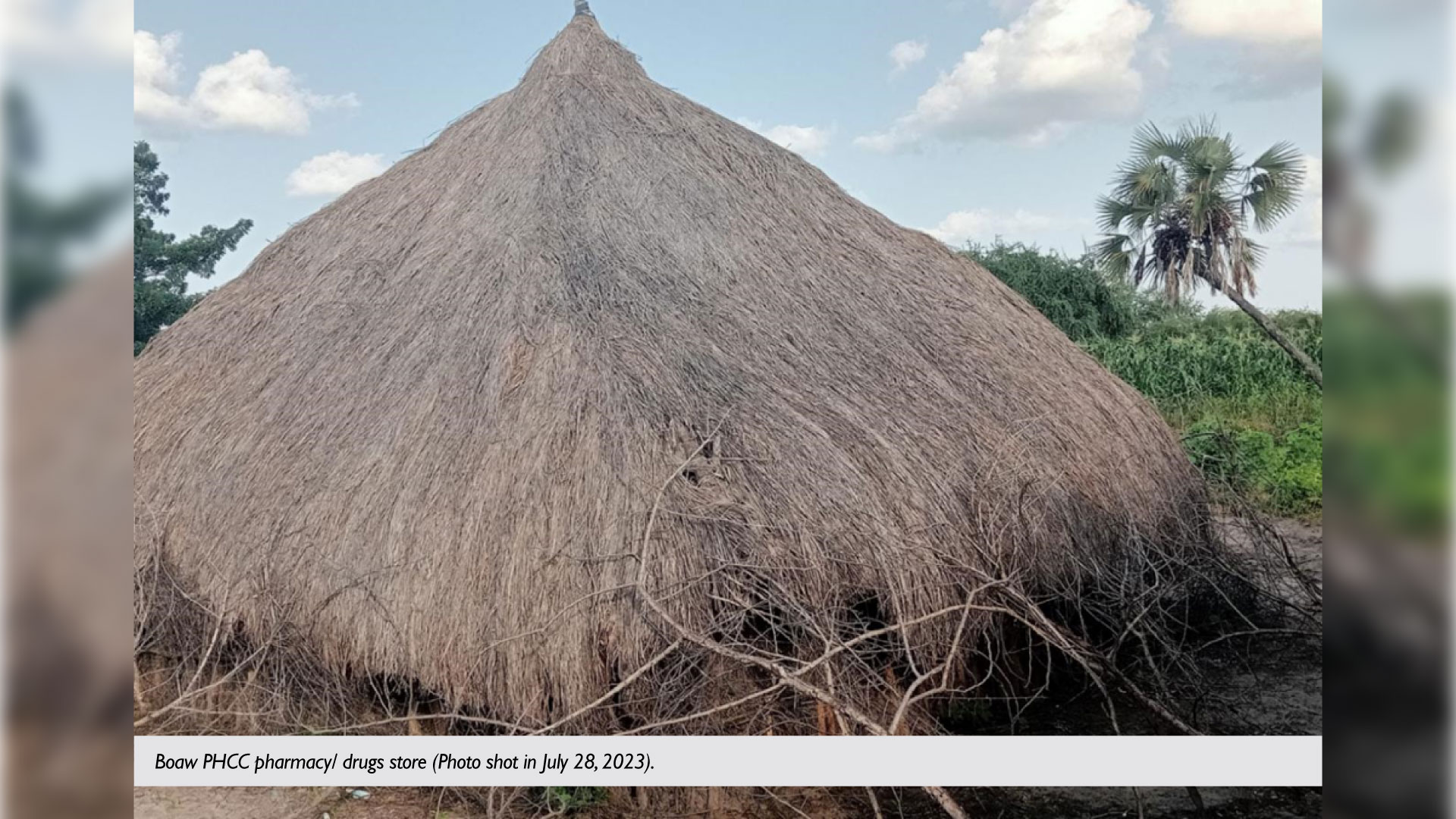
0 Comments